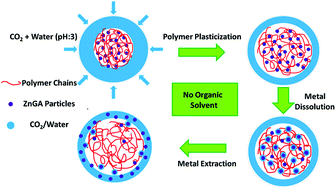A new solution for removing metal-based catalyst residues from a biodegradable polymer
Abstract
The presence of metal-based catalysts in polymers is one of the obstacles for their applications in food packaging and composting. The current processes for removing these compounds are not efficient; they involve several steps and use a large amount of organic solvents and acids. To tackle these issues, we developed a new green approach in which CO2 laden water was used for the extraction of these compounds from a commercial polymer, poly(propylene carbonate) (PPC). Although PPC has favourable properties for food packaging and many other applications, a high level of a metal-based catalyst remains in its matrix after the polymerization. Prior to the extraction process, the solubility of different metal-based compounds in CO2 laden water was measured. Our results demonstrated that at 160 bar and 40 °C the solubility of zinc adipate (ZnAA), zinc glutarate (ZnGA) and zinc methyl glutarate (ZnMGA) was 0.66 mg ml−1, 1.37 mg ml−1, and 1.54 mg ml−1, respectively. Therefore, we attempted to purify PPC containing 2450 ppm ZnGA residue using this technique. Our results demonstrated that CO2 laden water was able to remove nearly 90% of the catalyst from PPC at 70 bar and 45 °C in static mode extraction. The process developed in this study is superior to the current techniques as it not only reduced zinc residues 70% more than the conventional method in the absence of any organic solvent and acid, but it also enabled us to remove other impurities such as cyclic propylene carbonate (cPC). Therefore, this purification technique played a pivotal role in promoting the physico-chemical properties of PPC. For example, after the purification, the thermal decomposition temperature of PPC was shifted from 124 °C to 214 °C which is paramount for thermal processing such as hot-melt extrusion; its tensile modulus increased from 1 MPa to 1.4 MPa, which is critical for packaging and other applications. These results demonstrated that CO2 laden water is an efficient green solvent for removing metallic compounds from a polymer to the acceptable level recommended by environmental protection agencies for composting. It will also open an avenue for broadening the application of renewable polymers for food packaging to address major environmental issues.


 Please wait while we load your content...
Please wait while we load your content...